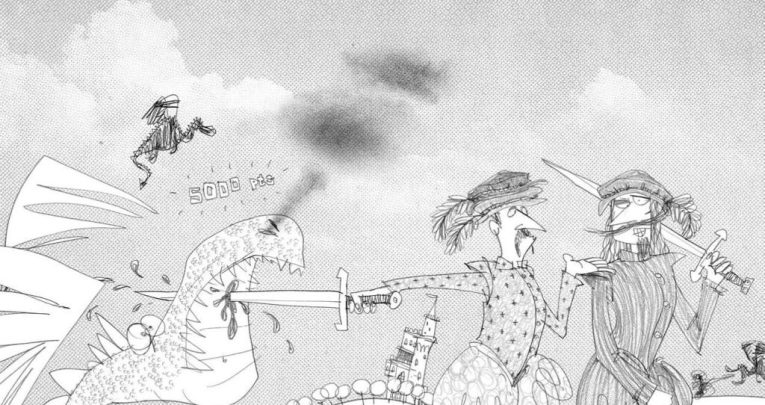Villains and Characters who Break the Rules in Books Allow Readers to Reconsider Their own Morals

Characters who break the rules in books allow readers of all ages to reconsider their own boundaries, says Andy Stanton…
- by Andy Stanton
- Children’s author Visit website

Thinking back to my relationship with reading as a kid, I remember it in so many ways. For example, when I was very small I used to ask my mum to read me the Mr Men books every night.
That’s not so unusual, I suppose; but I also used to make her test me on the names of all the characters on the back, in order. I still have a much better memory for the names and faces of Mr Men than I do for those of real people.
Stumbling across The Cat in the Hat at primary school, when I was about five, was a revelation. I could read for myself by then, and this book was completely different from anything I’d seen before. I was amazed to find out just how much you can do with words on a page; how wild and anarchic a simple story can be.
It’s not all so positive, though – I also recall, a couple of years later, a ‘lesson’ that involved the whole class being told to read for 15 minutes, then to stop and count up the number of words we’d read in that time.
I never got to the end of counting; maybe it was a maths teacher trying to crowbar her subject into a literacy session? In any case, I think it must be one of the most pointless things I’ve ever had to do.
I always had a book with me as a kid. And in my memories, I clearly connect specific books with different situations.
So, I know that when I visited my grandma in hospital, I was reading one of Enid Blyton’s Five Find Outers and Dog mysteries; I have a real soft spot for Enid Blyton (although you can keep The Secret Seven, thanks).
And I will never forget sitting at our kitchen table devouring Betsy Byars’ brilliant The Eighteenth Emergency for the first time.
I’d taken it out of the library because it looked interesting, with its Quentin Blake illustration on the cover – and I’ve loved it ever since. I relish how melancholy and bittersweet it is, and also, how it is such a small story; proof that you don’t need to put the end of the world into a book to make it exciting.
I was one of those bright, cheeky kids – a kind of Bart Simpson character – and I was always coming up with really, really stupid stories.
Some teachers told me to rein it in a bit, others encouraged me; but it was Miss Yates who taught me how to understand when surrealism is going too far, and always to put real emotions in there as well. It was my first important lesson about good writing.
Mr Gum came out of my frustration at never actually finishing any of the ideas I was always having. One Christmas Eve, I just sat down to see if I could write a complete story, to read to my cousins on Christmas Day.
I put a floppy disc into the computer (which tells you how long ago this was), and there was a paragraph on it about an old man terrorising a dog. “That’s as good a starting point as any,” I thought – and I wrote the first Mr Gum story, in full, that night.
I read it to my cousins next day… and then promptly forgot about it, until two years later, when I gave it a couple of edits and sent it off to some agents.
Everyone likes a ‘bad’ character; I think it’s because you can experience stuff vicariously through them that isn’t an option in real life.
As a kid, especially, you have to live by a load of rules, so to have someone breaking them all over the place is thrilling – and as adults, we’re still drawn to the ‘maverick’ figure who goes outside the system to achieve something.
Mr Gum taps into all of that; it’s something I stumbled across by accident, but now I tell children all the time: a great way to start a story is to come up with a villain, because then something will definitely happen. Great villains are engines for stories.
I don’t think all children’s books need a ‘message’, as such; but I do have secret agendas when I write. One of them is to put a lot of good heart and good will into a bunch of stupidity, and another is to show kids what a good time you can have when you play with ideas and with language.
My new book is written in about 15 or 16 different voices – it’s a collection of daft short stories set in different historical periods, but with all the action happening in Lamonic Bibber, the home of Mr Gum.
I’m really excited about it, because it will challenge my readers in a way they haven’t been challenged before… or at least, not by me.
Natboff! – One Million Years of Stupidity by Andy Stanton will be published by Egmont from 31 May, 2018.










